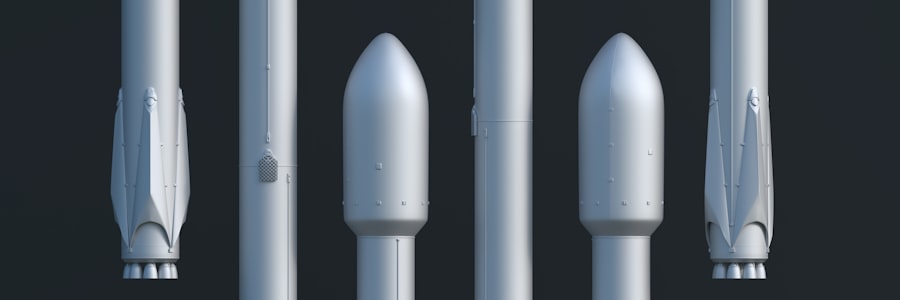In recent years, the landscape of space exploration has undergone a remarkable transformation, primarily driven by the emergence of private space companies. Once the exclusive domain of government agencies, the cosmos is now being explored and commercialized by a plethora of private enterprises. Companies like SpaceX, Blue Origin, and Virgin Galactic have not only captured the public’s imagination but have also significantly reduced the cost of access to space.
This shift has been fueled by advancements in technology, a growing interest in space tourism, and the potential for lucrative contracts with government entities. The success of these companies has demonstrated that private enterprises can innovate rapidly, often outpacing traditional government programs in terms of efficiency and creativity. As a result, the private sector is now seen as a vital player in the quest for interstellar exploration and the commercialization of space.
The rise of private space companies has also sparked a new wave of investment and interest in the aerospace sector. Venture capitalists and investors are increasingly pouring funds into startups focused on satellite technology, space tourism, and even asteroid mining. This influx of capital has led to a surge in research and development, enabling these companies to push the boundaries of what is possible in space exploration.
Moreover, the competitive nature of the private sector has fostered an environment where innovation thrives. Companies are incentivized to develop cutting-edge technologies that can outperform their rivals, leading to breakthroughs that were once thought to be the realm of science fiction. As these private entities continue to grow and evolve, they are reshaping our understanding of what it means to explore the final frontier.
Key Takeaways
- Private space companies have seen a significant rise in recent years, with companies like SpaceX and Blue Origin leading the way in space exploration.
- Government agencies, such as NASA and ESA, have historically played a key role in space exploration, providing funding, infrastructure, and expertise.
- Private space companies have the advantage of flexibility, innovation, and cost-effectiveness, but may lack the resources and experience of government agencies.
- Government agencies have the advantage of long-standing expertise, infrastructure, and funding, but may be limited by bureaucracy and political constraints.
- Collaboration between private and government entities can lead to innovation and cost-sharing, but competition may also arise, leading to duplication of efforts and inefficiencies.
The Role of Government Agencies in Space Exploration
Government Agencies: The Backbone of Space Exploration
Despite the rise of private space companies, government agencies remain pivotal in the realm of space exploration. Organizations such as NASA, ESA (European Space Agency), and Roscosmos have long been at the forefront of scientific research and technological advancement in this field. These agencies are responsible for some of humanity’s most significant achievements in space, including manned moon landings, Mars rover missions, and the construction of the International Space Station (ISS).
Foundations for Private Companies and Regulatory Frameworks
Their extensive experience and resources provide a foundation upon which private companies can build. Government agencies often set the regulatory framework that governs space activities, ensuring safety and compliance while fostering an environment conducive to innovation. Furthermore, government agencies play a crucial role in funding large-scale projects that may be too risky or expensive for private companies to undertake alone.
International Partnerships and Collaboration
For instance, NASA’s Artemis program aims to return humans to the Moon by 2024, a mission that requires substantial investment and collaboration across various sectors. These agencies also engage in international partnerships, pooling resources and expertise to tackle complex challenges that transcend national borders. The collaborative spirit fostered by government entities not only enhances scientific understanding but also promotes peaceful cooperation among nations in the pursuit of shared goals in space exploration.
Advantages and Disadvantages of Private Space Companies

The advantages of private space companies are manifold, with one of the most significant being their ability to innovate rapidly. Unlike government agencies, which often operate within bureaucratic frameworks that can slow decision-making processes, private companies can pivot quickly in response to new information or market demands. This agility allows them to develop new technologies at an unprecedented pace, leading to cost-effective solutions for launching payloads into orbit or conducting scientific research.
Additionally, the competitive nature of the private sector drives companies to improve efficiency continually, resulting in lower launch costs and increased accessibility to space for a broader range of stakeholders. However, the rise of private space companies is not without its drawbacks. One major concern is the potential for profit motives to overshadow scientific integrity and safety standards.
In their quest for profitability, some companies may prioritize speed over thorough testing or cut corners that could compromise safety. Furthermore, the commercialization of space raises ethical questions about resource exploitation and environmental impact. As private entities venture into areas like asteroid mining or lunar colonization, there is a pressing need for regulations that ensure sustainable practices and protect celestial bodies from degradation.
Balancing innovation with responsibility will be crucial as these companies continue to expand their reach into the cosmos.
Advantages and Disadvantages of Government Agencies
Government agencies bring a wealth of experience and stability to space exploration efforts. Their long-standing history in aerospace research has equipped them with invaluable knowledge and expertise that can guide missions from conception through execution. These organizations often have access to substantial funding from taxpayer dollars, allowing them to undertake ambitious projects that may not yield immediate financial returns but are essential for scientific advancement.
Moreover, government agencies are typically held to rigorous safety standards and ethical guidelines, ensuring that missions are conducted responsibly and with public accountability. On the flip side, government agencies can be hindered by bureaucratic red tape that slows down decision-making processes and stifles innovation. The need for extensive oversight and compliance with regulations can lead to delays in project timelines and increased costs.
Additionally, shifts in political priorities can impact funding and support for specific missions or programs, creating uncertainty for long-term projects. As government agencies navigate these challenges, they must also contend with the growing presence of private companies that may offer more agile solutions. Striking a balance between maintaining rigorous standards while embracing innovative approaches will be essential for government entities as they continue their vital role in space exploration.
Collaboration and Competition between Private and Government Entities
The interplay between private companies and government agencies is characterized by both collaboration and competition, creating a dynamic environment for space exploration. On one hand, partnerships between these entities can lead to groundbreaking advancements. For instance, NASA has engaged in contracts with private firms like SpaceX for cargo resupply missions to the ISS, allowing government resources to be allocated more efficiently while benefiting from the innovative capabilities of private industry.
Such collaborations enable knowledge sharing and resource pooling that can accelerate progress toward shared goals in space exploration. Conversely, competition between private companies and government agencies can drive innovation but may also lead to tensions over priorities and funding allocations. As private firms increasingly take on roles traditionally held by government entities—such as launching satellites or conducting scientific research—there is a risk that public interests may be sidelined in favor of profit-driven motives.
This competition necessitates clear communication and strategic alignment between both sectors to ensure that efforts complement rather than undermine one another. By fostering an environment where collaboration thrives alongside healthy competition, both private companies and government agencies can work together toward a common vision for humanity’s future in space.
The Future of Space Exploration: Balancing Private and Government Efforts

Looking ahead, the future of space exploration will likely hinge on finding an effective balance between private enterprise and government involvement. As technology continues to advance at an unprecedented pace, both sectors must recognize their unique strengths while working collaboratively toward shared objectives. Government agencies can provide essential oversight and funding for large-scale projects that require significant investment and long-term commitment.
Meanwhile, private companies can leverage their agility and innovative spirit to develop new technologies that enhance our capabilities in space. To achieve this balance, it will be crucial for policymakers to establish frameworks that encourage collaboration while ensuring accountability and ethical practices within both sectors. This may involve creating incentives for public-private partnerships or developing regulatory guidelines that promote sustainable practices in space exploration.
By fostering an environment where both private companies and government agencies can thrive together, we can unlock new possibilities for scientific discovery and technological advancement that will benefit humanity as a whole.
Implications for the Future of Space Exploration
The implications of this evolving landscape for space exploration are profound and far-reaching. As private companies continue to push boundaries and redefine what is possible in aerospace technology, we may witness a democratization of access to space that was previously unimaginable. This could lead to an era where not only governments but also individuals and small organizations can participate in space missions, fostering a new wave of innovation driven by diverse perspectives and ideas.
The potential for commercial ventures such as space tourism or asteroid mining could open up new economic opportunities while simultaneously inspiring future generations to pursue careers in science, technology, engineering, and mathematics (STEM). However, this new era also brings challenges that must be addressed thoughtfully. The commercialization of space raises ethical questions about ownership rights over celestial resources and environmental stewardship beyond our planet.
As we venture further into the cosmos, it will be essential to establish international agreements that govern activities in outer space while ensuring equitable access for all nations. Balancing exploration with responsibility will be paramount as we navigate this uncharted territory together. Ultimately, the future of space exploration will depend on our ability to harness the strengths of both private enterprises and government agencies while fostering collaboration that prioritizes humanity’s collective interests in our quest for knowledge beyond Earth.
For those interested in the broader implications of technology and innovation, particularly in the context of space exploration, you might find insights in how advanced technology is shaping other industries. A relevant read is an article that explores the capabilities of the Samsung Galaxy Z Fold4, a device that exemplifies the integration of cutting-edge technology in consumer products. This could provide a perspective on how rapidly evolving technology might influence future space exploration technologies. You can read more about it here.
FAQs
What is the current state of space exploration?
As of now, space exploration is primarily led by government space agencies such as NASA, ESA, Roscosmos, and CNSA. These agencies have been responsible for most of the major space missions and discoveries.
What are private companies doing in the field of space exploration?
Private companies such as SpaceX, Blue Origin, and Virgin Galactic have been increasingly involved in space exploration. They are developing their own spacecraft, launch vehicles, and space tourism initiatives.
How do private companies and government agencies differ in their approach to space exploration?
Government agencies are typically funded by taxpayer money and focus on scientific research, exploration, and international collaboration. Private companies, on the other hand, are driven by profit and often prioritize commercial ventures such as satellite deployment, space tourism, and asteroid mining.
What are the advantages of private companies in space exploration?
Private companies bring innovation, competition, and cost-efficiency to the space industry. They are able to take more risks and operate with greater flexibility compared to government agencies.
What are the advantages of government agencies in space exploration?
Government agencies have a long history of successful space missions and have the resources and expertise to tackle complex scientific challenges. They also prioritize international cooperation and the advancement of human knowledge.
What is the future of space exploration likely to look like?
The future of space exploration is expected to involve a combination of government agencies and private companies working together. This collaboration may lead to more ambitious missions, increased access to space, and the commercialization of space activities.

